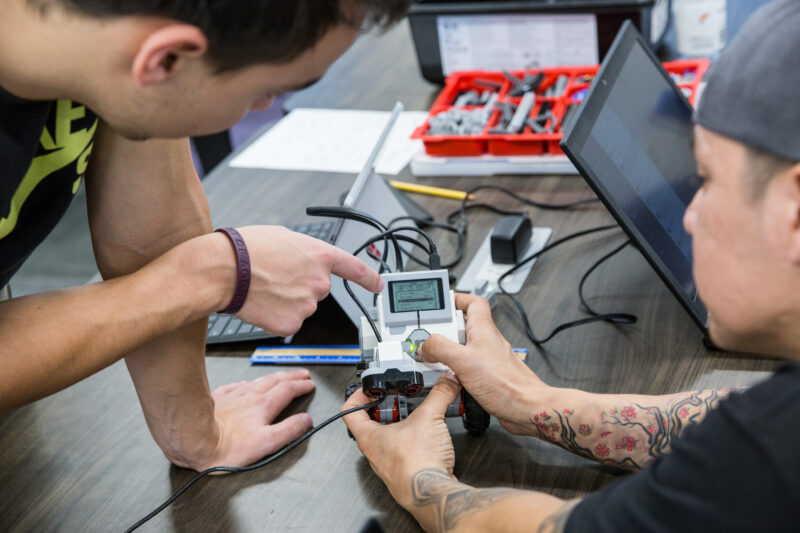
Careers in Engineering
Careers in Engineering
By ACC Professor Shana Shaw
What do engineers do?
Simply put, engineers apply technology in useful ways.
What kinds of engineers are there?
Aerospace Engineers
-
-
- Emphasize aerodynamics, fluid mechanics, structures, heat transfer, hydraulics, control systems
- Design airplanes, rockets, space vehicles, bullet trains, automobiles
- American Institute of Aeronautics & Astronautics (AIAA)
-
Agricultural Engineers
-
-
- Emphasize hydrology, soil mechanics, fluid mechanics, heat transfer, combustion, climatology, chemistry, biology
- Produce food on a large scale within the earth’s ecosystem
- American Society of Agricultural and Biological Engineers (ASABE)
-
Biomedical Engineers
-
-
- Apply modern engineering methods to medicine and human health
- Design medical instrumentation, prostheses, implants, assistive appliances
- Biomedical Engineering Society (BMES)
-
Chemical Engineers
-
-
- Emphasize chemistry, fluid transfer
- Design manufacturing and production systems involving chemical reactions on a production scale
- American Institute of Chemical Engineers (AIChE)
-
Civil Engineers
-
-
- Emphasize structures, strength of materials, construction, soil mechanics
- Design infrastructure such as transportation systems, water treatment plants, aquifers
- American Society of Civil Engineers (ASCE)
-
Computer Engineers
-
-
- Combines engineering and computer science
- Design hardware, software, digital communication such as processors, personal computers, networks, operating systems, Internet servers
- Association for Computing Machinery(ACM)
-
Electrical Engineers
-
-
- Emphasize all forms and uses of electricity
- Design information theory, control theory, electronics, television systems, electric power systems, speech processing systems, semiconductors, fiber optics
- Institute of Electrical and Electronic Engineers (IEEE)
-
Environmental Engineers
-
-
- Rely on biology and chemistry to solve environmental issues
- Design systems in pollution control, recycling, waste disposal, ozone depletion
- American Academy of Environmental Engineers and Scientists (AAEES)
-
Industrial Engineers
-
-
- Concerned with the total lifecycle of a product
- Design robotics, manufacturing systems, fabrication methods, machinery
- Institute of Industrial Engineers (IIE)
-
Materials Engineers
-
-
- Use all forms of physical matter on a macroscopic and microscopic scale
- Design composites, fuel cells, metal alloys, ceramics, polymers, biomaterials
- American Society for Metals (ASM)
-
Mechanical Engineers
-
-
- Concerned with designing and building physical structures involving mechanical motion using structures, heat transfer, thermodynamics, fluid mechanics, controls, materials, energy conversion
- Design automobiles, turbines, pumps, furniture, engines, computer cases, appliances, toys
- American Society of Mechanical Engineers (ASME)
-
Mechatronics Engineers
-
-
- Emphasize mechanical engineering, electrical engineering, and robotics
- Design and build automation systems, robotic products, manufacturing systems
- American Institute of Mechatronics Engineers (AIME)
-
Naval Engineers
-
-
- Emphasize materials, structures, water propulsion, dynamics, fluid mechanics
- Design ships, submarines, yachts, shipping docks, coastal navigation facilities
- American Society of Naval Engineers (ASNE)
-
Nuclear Engineers
-
-
- Emphasize atomic physics
- Design nuclear reactors, nuclear power plants, nuclear waste facilities
- American Nuclear Society (ANS)
-
Petroleum Engineers
-
-
- Emphasize physics, geology, chemistry, mathematics
- Design oil and gas recovery systems
- Society of Petroleum Engineers (SPE)
-
Systems Engineers
-
-
- Emphasize information systems, automation, supply-chain management, electronics, logistics
- Design large-scale software and complex engineering systems, communication networks, transportation infrastructure
- International Council on Systems Engineering (INCOSE)
-